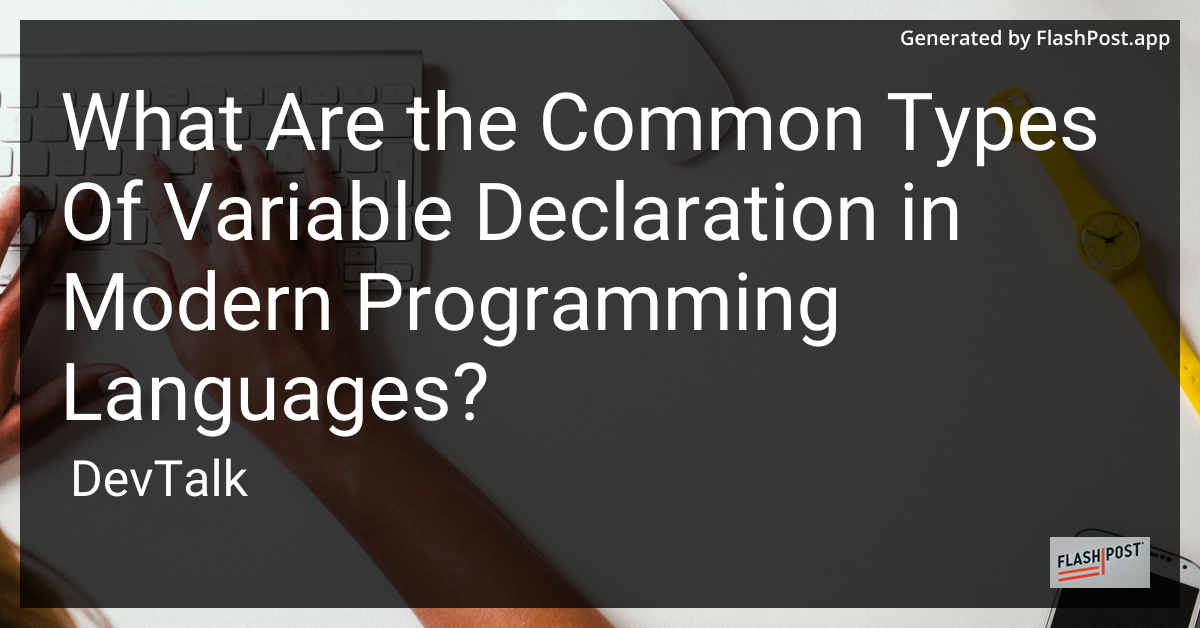What Are the Common Types Of Variable Declaration in Modern Programming Languages?

Common Types of Variable Declaration in Modern Programming Languages
In the world of programming, variables are foundational elements that allow developers to store and manipulate data.
Every programming language offers mechanisms to declare variables, each with unique features and constraints. Understanding these common types of variable declarations in modern programming languages can greatly enhance your coding efficiency and effectiveness.
Static Variable Declaration
Static variables are variables that retain their value between function calls. Typically, they are declared within a function or a method and persist even after the function exits. This is particularly useful for maintaining state information across multiple invocations.
Example
In C programming, a static variable is declared using the static keyword:
static int count = 0;
Global Variable Declaration
Global variables are accessible throughout the entire program, across all functions and modules. They are defined outside any function and can be useful when data needs to be shared among several parts of the program.
Example
In JavaScript, a global variable can be declared without the var, let, or const keywords:
myGlobalVariable = "I am global";
For more on JavaScript variable declaration, you can check JavaScript Variable Declaration.
Local Variable Declaration
Local variables are declared within a function or a block and can only be used within that specific scope. Once the function or block execution is complete, local variables cease to exist.
Example
In Python, a local variable is simply declared by assigning a value inside a function:
def my_function():
local_var = "I am local"
Constant Variable Declaration
Constants are variables whose values cannot be changed once initialized. They are used to maintain fixed values that should not be altered, such as mathematical constants or configuration parameters.
Example
In Java, constants are declared using the final keyword:
final int SPEED_OF_LIGHT = 299792458;
Typed and Untyped Variables
Modern programming languages may enforce type declaration or allow dynamic type allocation.
Typed Variables
Typed variable declarations specify the kind of data a variable can hold.
int myNumber = 10;
Untyped Variables
Languages like JavaScript allow declaring variables without specifying their type:
let myVariable = 20; // can be changed to a different type later
Special Variable Declarations in Databases and Other Languages
Variable Declaration in CodeIgniter
CodeIgniter, a framework for PHP, uses standard PHP variable declaration syntax. Read more on Variable Declaration in CodeIgniter.
LINQ Variable Declaration
In LINQ, variables can be defined within queries for data processing. Learn more about LINQ Variable Declaration.
Cursor Variable Declaration in PostgreSQL
PostgreSQL uses cursors for working with large result sets. Discover more on Cursor Variable Declaration.
Prolog Variable Declaration
Prolog handles variables differently and variables are denoted by uppercase. More details can be found here.
In conclusion, understanding variable declarations across various programming languages enhances a developer's ability to select the appropriate type for their task, ensuring efficient and clear code design. By learning the specificities of each language's variable management, developers can leverage the full potential of their programming tools.